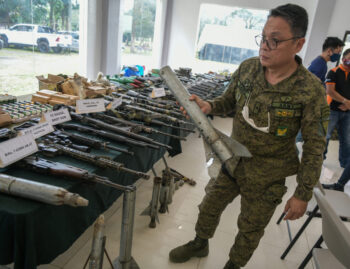CAGAYAN DE ORO CITY (MindaNews / 30 Jan) – It would do Mindanao society a lot of good if those who truly care about its fate— Bangsamoro advocates, for example—learn to pay a little more attention and effort to governing and civilizing their community.
GOVERNING is simply another term for managing. Overseeing human as well as non-human resources of the community, such that they produce progress and improve quality of life for all.
CIVILIZING is humanizing the neighborhood, making it more orderly; rendering it conducive to harmony, solidarity, and mutual cooperation; thus pave the way to progress and prosperity.
These are citizen duties, the means to advance social and economic progress by replacing the mean-spirited with the civic-spirited.
Doing so is what affirmative action means. It is the concrete way to strengthen the grassroots. It secures the building blocks of the republic which are its basic communities (barangays).
Affirmative action is especially effective when citizens who are not perceived as regular activists are the ones doing it. They command respect by virtue of their station or calling, and thus are more likely to attract cooperation or a local following.
Visibility
The initiative need not be spectacular or entail extraordinary effort. Often just by being present or visible in the arena of action helps a lot already.
Simply by showing concern about social or governance issues makes local society sit up and take notice. It alerts the neighborhoods that something important is taking place. It arouses interest and makes people watch out for something momentous to happen. And that’s a step away from getting involved.
Visibility on the part of the middle and upper classes is especially important. Looked up to or idolized as the movers and shakers of society, they are generally viewed as the most successful sector of the community. Thus they can set off fads, fashions, and trendy social practices.
Pace-setters, they’re influential, which is why they are referred to as “leading citizens” or the elite, which usually means they’re worthy of emulation.
As such, any civic involvement on their part attracts others, encouraging wider public participation. Properly motivated, they can actually trigger change or reform—in attitudes, in values, in people’s work ethic.
They can enrich community relations by inspiring others to be civic-minded—in the process, neutralize the mean-spirited and stop them from exploiting people and the weakness of the political system.
Elite Influence
Because the elite are often the local employers, teachers, professors, or pastors, they are in a unique position to impart desirable values and ethical standards that are essential for the public service, and also for the private sector of the community.
Others are there too—bankers, managers, lawyers, and heads of civic clubs like Rotary or Jaycees. Individually or collectively, they can propagate better practices for professionals and service providers.
They can also promote wholesome pursuits that discourage habits that suborn graft and corruption or induce practices that create injustice.
Then there are the artists and craftsmen, writers and editors, reporters and broadcasters. They too have valuable contributions and perspectives that civilize community living further—refining manners, preventing violence, condemning crime or barbarism, facilitating the wheels of justice. They have an essential role to play in smoothing the way for reforms to take place.
Even if only through personal example, all of them—directly or indirectly, individually or collectively—can discourage wrongdoing and make behavioral change, crowding out the mean-spirited with the civic-spirited in the community.
Civic Spirit
The one ideal we must all strive to attain is to be able honestly and without dissembling to claim that life in the neighborhood is better because of our presence in it.
The question to ask therefore should be: Is my barangay a pleasant or progressive place today because of what I and my neighbors did or contributed to it?
From such attitude emerges social change and reform… subtly, gently, and more effectively than sermons or seminars.
(Manny was former UNESCO regional director for Asia-Pacific, secretary-general of the Southeast Asian Publishers Association, a director at the development academy of the Philippines, vice chair of the Local Government Academy, and 2004 PPI-UNICEF awardee for outstanding columnist. He heads Gising Barangay Movement as national convenor and president. valdehuesa@gmail.com.)







